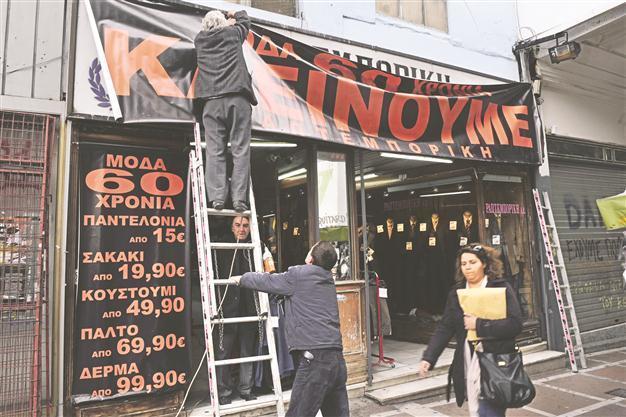Eurozone steps up Greek surveillance
BRUSSELS

A shop owner hangs a banner outside his clothing store in central Athens reading ‘60 years of fashion - Now we’re closing’ on Feb 14. AFP photo
The eurozone told Greece it must accept tough EU surveillance if it is to unlock a stalled bailout next week and avoid a messy default, despite meeting key hurdles at talks on the evening of Feb. 15.A statement from Eurogroup chair Jean-Claude Juncker after a lengthy video conference, during which hardline finance ministers demanded rigid oversight of Greek state revenues and expenditure, avoided any direct mention of the disputed 230-billion-euro ($300 billion) rescue.
Instead, following a day of fraying tempers in the months-long tug-of-war, the Luxembourg prime minister said only that he was confident his colleagues could “take all the necessary decisions on Monday,” when they next meet face-to-face in Brussels.
With the clock running down on a 14.5-billion-euro bond repayments deadline for the Greek government on March 20, the euro lost ground against the dollar for a fourth straight day and US markets also ended trading down.
The termperature had risen early in the day when German Finance Minister Wolfgang Schaeuble warned: “We can help, but we are not going to pour money into a bottomless pit.”
Hit with mounting conditions to obtain loans first promised in October, Greek Finance Minister Evangelos Venizelos told his citizens that “several” of his adversaries “no longer want us” in the currency area.
President Carolos Papoulias, a resistance fighter during Greece’s World War II occupation by Germany, took personal exception, the 82-year-old crying: “I do not accept having my country taunted by Mr. Schaeuble, as a Greek I do not accept it.”
He named the Dutch and the Finns as chief cheerleaders, Dutch premier Mark Rutte having already floated publicly a willingness to contemplate an eventual Greek euro exit.
Juncker credited Greece with delivering on three conditions laid down at ministers’ last gathering six days earlier.
Greek coalition leaders had given “strong assurances” that austerity and reform would be upheld by whoever wins an April general election, he said, while foreign auditors provided an analysis of Greek debt sustainability and Athens identified an extra 325 million euros in cuts.
In a letter demanded by eurozone partners, Greek Conservative leader Antonis Samaras, tipped to win, said his party would “remain committed to the objectives, targets and key policies” identified by a so-called troika running a first bailout begun nearly two years ago.
But the conditions Greece must meet for revamped aid are still mounting, Juncker flagging “a detailed list of prior actions” Greece must complete, “together with a timeline for their implementation.”
















